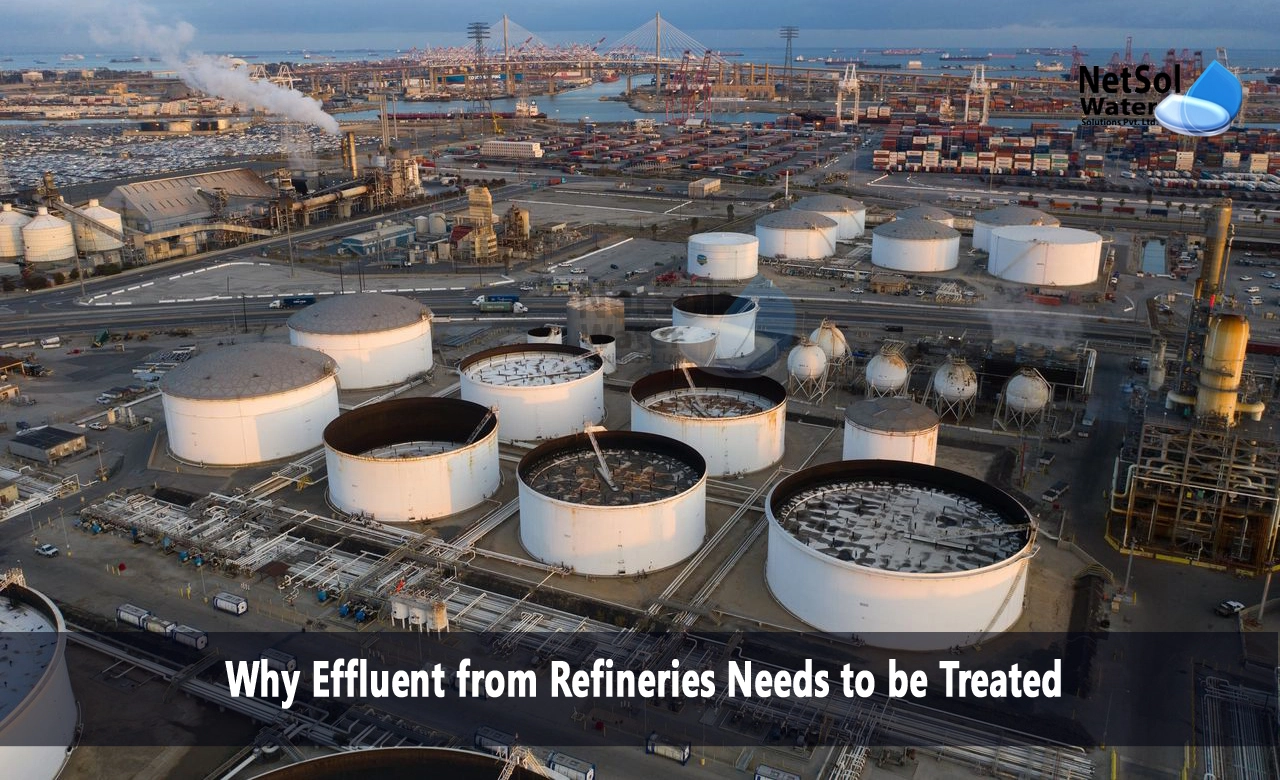Refineries are integral to the global energy landscape, transforming crude oil into a wide array of petroleum products that fuel industries and economies worldwide. However, the refining process generates substantial amounts of wastewater, commonly referred to as refinery effluent, which contains a complex mixture of pollutants that can pose severe risks to the environment and human health if left untreated. Consequently, effective refinery effluent treatment processes are of paramount importance to mitigate environmental impacts, safeguard public health, and ensure compliance with stringent regulatory standards.
What are Refineries?
Refineries are sophisticated industrial facilities designed to convert crude oil into a diverse range of refined petroleum products through a series of intricate physical and chemical processes. These processes involve distillation, cracking, reforming, and other refining techniques that separate and transform the various components of crude oil into essential fuels and petrochemicals. Refineries are critical components of the global energy infrastructure, providing indispensable products for transportation, heating, industrial applications, and numerous other sectors.
Why Effluent from Refineries Needs to be Treated?
Effluent generated from refineries contains a complex cocktail of contaminants, including hydrocarbons, heavy metals, suspended solids, and toxic chemicals, which can have devastating effects on the environment and public health if discharged untreated. The following are key reasons why effluent from refineries necessitates comprehensive treatment:
1. Water Pollution: Untreated refinery effluent can contaminate water bodies, leading to ecosystem degradation and the loss of aquatic biodiversity. Pollutants such as hydrocarbons and heavy metals can accumulate in sediments and biota, posing long-term risks to aquatic ecosystems and the food chain.
2. Impact on Human Health: Contaminants present in refinery effluent can enter the food chain through bioaccumulation, potentially exposing humans to harmful chemicals through the consumption of contaminated seafood or drinking water, leading to adverse health effects.
3. Regulatory Compliance: Governments enforce strict regulations to protect water quality, ecosystems, and public health, requiring refineries to treat their effluent before discharge to meet specified standards. Failure to comply with these regulations can result in hefty fines, penalties, and reputational damage.
4. Community Concerns: Refinery operations often coexist with nearby communities, raising concerns about air and water pollution, noise, and odors. Effective effluent treatment helps address community concerns and fosters positive relationships between refineries and neighboring communities, promoting social responsibility and environmental stewardship.
Process Involved in Effluent Treatment
Effluent treatment for refineries involves a multi-stage approach aimed at removing or reducing pollutants to acceptable levels before discharge. The treatment process typically includes the following steps:
1. Preliminary Treatment: This initial step involves the removal of large solids, debris, and oil from the wastewater through physical processes such as screening, sedimentation, and skimming. Preliminary treatment prevents clogging of downstream equipment and facilitatessubsequent treatment processes.
2. Primary Treatment: In primary treatment, the effluent undergoes further sedimentation to separate suspended solids, oil, and grease. Gravity settlers or clarifiers are commonly used to allow these substances to settle out of the wastewater, producing a clarified effluent stream.
3. Secondary Treatment: Secondary treatment aims to remove dissolved and colloidal organic matter, as well as nutrients, from the effluent. Biological treatment processes, such as activated sludge, biological aerated filters, and sequencing batch reactors, are commonly employed. These processes promote the growth of aerobic bacteria that metabolize organic compounds into carbon dioxide, water, and biomass.
4. Tertiary Treatment: Tertiary treatment is an additional step employed to further improve effluent quality, especially in cases where stringent discharge standards must be met. Tertiary treatment technologies include advanced filtration techniques such as membrane filtration, ultrafiltration, and reverse osmosis, which remove remaining suspended solids, dissolved contaminants, and pathogens from the effluent.
5. Disinfection: The final step in effluent treatment involves disinfection to eliminate harmful pathogens and bacteria. Common disinfection methods include chlorination, ultraviolet (UV) irradiation, and ozonation. Disinfected effluent can then be safely discharged into receiving water bodies or reused for non-potable purposes such as irrigation or industrial processes.
6. Sludge Treatment and Disposal: Throughout the treatment process, sludge containing concentrated contaminants is generated. This sludge requires further treatment, such as thickening, dewatering, stabilization, and disposal or beneficial use (e.g., land application or energy recovery).
Conclusion
Effective refinery effluent treatment is a critical aspect of sustainable refinery operations, ensuring that environmental impacts are minimized, public health is safeguarded, and regulatory requirements are met. By implementing comprehensive treatment processes tailored to the specific characteristics of the effluent, refineries can effectively remove or reduce the concentration of various contaminants, such as hydrocarbons, heavy metals, and toxic substances, before discharging or reusing the treated water.
The treatment process typically involves multiple stages, including preliminary, primary, secondary, and tertiary treatments, along with disinfection and sludge management. Advanced technologies like advanced oxidation processes, adsorption, ion exchange, and membrane filtration are often employed to achieve high levels of contaminant removal and meet stringent discharge standards
As environmental concerns and regulations continue to evolve, refineries must remain committed to investing in effective effluent treatment technologies and practices. By doing so, they can contribute to the preservation of water resources, protect ecosystems, and demonstrate their commitment to sustainable operations and environmental stewardship.
Effective refinery effluent treatment is not only an environmental necessity but also a social responsibility. By prioritizing responsible wastewater management, refineries can play a vital role in safeguarding the health of communities and ecosystems, while ensuring a sustainable future for the energy industry and promoting a more sustainable global energy landscape.
Netsol Water is Greater Noida-based leading water & wastewater treatment plant manufacturer. We are industry's most demanding company based on client review and work quality. We are known as best commercial RO plant manufacturers, industrial RO plant manufacturer, sewage treatment plant manufacturer, Water Softener Plant Manufacturers and effluent treatment plant manufacturers. Apart from this 24x7 customer support is our USP. Call on +91-9650608473, or write us at enquiry@netsolwater.com for any support, inquiry or product-purchase related query.



